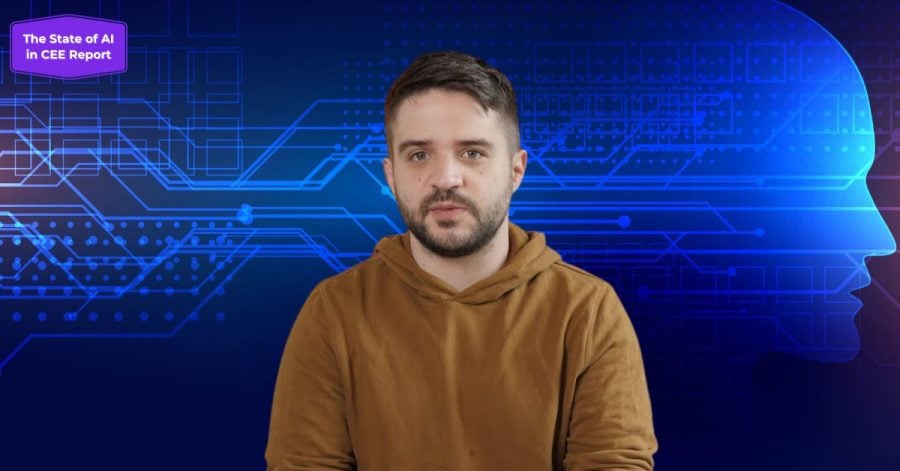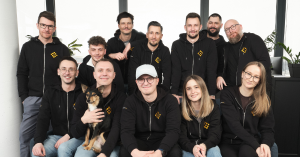The following interview was conducted as a part of The Recursive’s “State of AI in CEE” report. Download the full report with insights from 40+ experts and an analysis of 900 AI product companies from CEE here.
As an ecosystem builder in Hungary, Csongor Bias used to run co-working spaces and incubator programs, many startup organizations, and had a software agency that was also working closely with startups from the country.
Today, in his role as Startup Hungary’s managing director, Bias is actively contributing towards the overall development of Hungary’s startup ecosystem.
In an interview for The Recursive, Bias discusses the country’s potential when it comes to the AI industry and the various verticals where Hungarian AI startups and companies have been excelling.
The Recursive: What are some of your most notable companies in the AI field in Hungary right now and why?
Csongor Bias: Hungary was pretty strong on AI even before it was cool. We had strong companies starting before the recent ChatGPT-powered AI hype. I’m talking about mostly some of the deep tech startups that we have such as aiMotive, which was actually acquired at the beginning of the year by Stellantis for a rumored 250-300 million, so that was one of the largest acquisitions in Hungary happening, and they are in the autonomous vehicle industry.
Then Turbine, which is using machine learning for drug discovery in the biotech space. Even SEON, they’re using a lot of machine learning and AI algorithms.
I think that startups in Hungary were taking advantage of the strong STEM education, and the talent pool of NLP experts and machine learning experts. I think we have a fairly large pool of data scientists, and definitely a strong pool of communities. You know, it’s not a coincidence that large companies like Cloudera also have their headquarters here, so I think that Hungary definitely has that kind of advantage in this AI era and it has the ability to produce some cool stuff.
What are the biggest challenges that you have seen Hungarian organizations face when they are developing and using AI products?
I think the same issues, not just in Hungary but like pretty much everywhere. Europe kind of has this dependency on big tech again – I just read a report saying that 70% of the AI models are developed in the US, 13-14% in China, and that the core level of AI seems to be dominated outside of the European continent.
That said, I think there is still a lot of value creation opportunity on the application layer and there are certainly interesting companies popping up from around the region and throughout Europe.
I certainly believe that we have the talent pool to ride on this wave. I’m not quite sure how big of a problem is that large modules will be developed outside, but still, I think that Hungary and Central Eastern Europe are in a good position, due to the deep technical knowledge that the local talent will have.
How do Hungarian educational institutions and universities contribute to the talent pool for AI professionals?
On a fundamental level, we have a history of developing great mathematicians, the foundation for fundamental computing, and so on. Hungary, Poland and other V4 countries have been performing very well in the mathematics and programming Olympics, and like different competitions where very deep algorithmic skills and deep analytical knowledge is needed. So I think the fundamental level is there.
I think due to bureaucracy, and old-school systems, universities may struggle to be up to date on the most up-to-date knowledge. But still, the Internet kind of democratized the opportunity for everybody to self-learn so we will have the fundamentals to build strongly. I think that we do have a good position for the local talent pool to be on the edge of innovation, but the universities definitely have to catch up and try to be very much on the curve of innovation.
How would you describe the current landscape of AI investment in CEE? How would you compare that landscape to the one in Western Europe?
Lots of companies in Hungary are struggling to raise their Series A or B rounds, even when they have good metrics and good numbers. Recently we had Colossyan, one of the other up-and-coming GenAI synthetic video spaces, raised from Bulgarian investors and the space where they operate is pretty hot. Whereas, there have been other companies who also have good metrics and good benchmarks, and that might struggle more. So I think that the AI hype interest that we see from investors is also present in Hungary and the region.
How has the AI industry landscape in Hungary evolved over the past few years? What types of AI technologies or applications do you see as most promising for development in the near future?
Hungary is definitely strong in autonomous vehicles and driving departments, anything that is connected to visual recognition, also anything that’s in the middle of various industries like biotech, for example between that and machine learning. I think that we have a good track record of showing good companies in these industries.
And definitely, in the application layer of AI companies, some of the best SaaS companies like SEON quickly adopted and introduced the AI-powered features in their product set, and are taking advantage of these new models and opportunities.
How do you think the upcoming EU AI regulatory framework will impact the adoption of AI products and services?
The awareness about this is very low – we created several surveys and most people have either not heard about it or just heard about it, but didn’t really look into what it can entail. And I definitely think that the EU should be very cautious and talk with the industry players and try to not create a regulation that would increase the gap that as a continent we already have behind the US and China.
The AI Act was also heavily criticized for not being clear enough, especially about what are the especially important industries that need to be regulated. In the last form that I was seeing the biggest concern was that it was too broad, the limitations aren’t there when it comes to the strategically important industries and that can definitely draw back innovation without a doubt.
How would you evaluate cooperating and networking with other stakeholders to advance AI technology in Hungary or the CEE region?
To be honest, the most notable startups in Hungary, not just in AI, but in AI, too, they ignore the local market, and they try to go global from day one. So I don’t see many efforts of these kinds of collaborations. That said, for example, with the CEO of the drug discovery startup Turbine, who is also one of the founders and a board member, we have started to work on basically creating a deep tech biotech ecosystem. So we definitely want to get in touch with decision makers and universities, and so on.
But market wise and for running pilots and sandboxes, they are more focusing on the US market, UK market, and pretty much ignoring the domestic market. And I think that’s the right decision for them because they want to build a global business since Hungary is just too small of a market for them.
Which factors do you reckon will have the biggest impact on improving the outlook for AI-powered innovation in Hungary or the CEE in general?
Definitely, education as a long-term project – the government should definitely increase the number of people working and going into STEM education and there is a continuous need for more and more engineers. So, popularizing and increasing the number of these courses in higher education. And generally improving the state of education is the best investment the government can make for this.
Apart from that – we need to remove any sort of regulatory barriers and try to be very cautious and make sure that the AI Act isn’t in the way of innovation. I think that Europe shouldn’t make the same mistake that it made by trying to protect itself with bureaucracy and then regulation – but rather try to remove bureaucracy to lay down the foundation that can put us at the lead of innovations.








